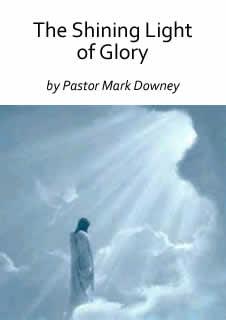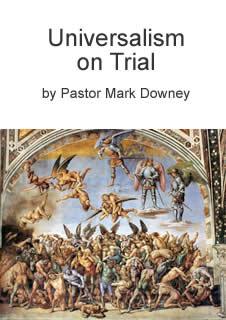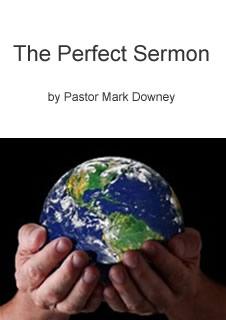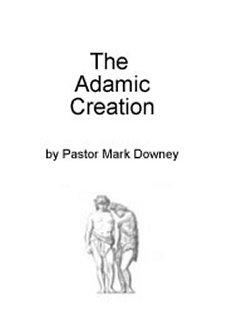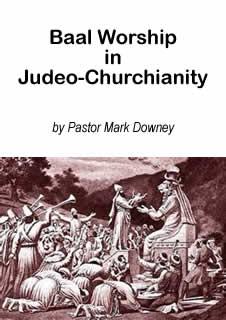by Pastor Mark Downey
Scripture Reading: I Kings 19:9-12
What gets your attention? A tornado twisting through your immediate neighborhood? An earthquake that shakes you out of your bed? Or perhaps a smoke alarm that indicates your home is on fire? People often refer jokingly to a bolt of lightning or a burning bush before they are motivated to take notice of something, even though these two supernatural elements are mentioned in the Bible and got people’s attention. There are times when spectacular events ordained by the divine hand of God do not register in the minds of man. It’s just “mother nature” or the inane mindset that ‘it is what it is.’ However, God is not without other means by which He gets your attention.
We are living in a day and age where Madison Avenue is trying to sell you something, either by hook or crook, meaning unethical mind-control techniques. And thus, we are bombarded every day with an assault of visual and audio advertising, unless you live in a cave like Elijah. Even churchianity has jumped onto the illicit bandwagon of smoke and mirrors, gimmicks and trickery. There’s even an occult technology of power to reach you on a subconscious level to make you hear voices in your head. But, today’s message is to help you overcome all of that ungodly influence. Do you know how to focus on Christ?
The story of Elijah in chapter 19 of I Kings is admittedly a perplexing passage to get a handle on. We’ve heard about that mysterious ‘still small voice’ (found only in this one place), but usually haven’t heard about the context and what it portends. Some of the modern translations have changed the traditional KJV rendering of a ‘still small voice,’ but have not improved upon it. It’s been altered to read, “a gentle murmuring sound,” “a whistling of gentle air,” “a soft gentle voice,” “a sound of gentle blowing,” and my favorite from the NRS is “a sound of sheer silence,” but it really sounds too Simon and Garfunkel for me.
Elijah had just won a spectacular victory over some 450 priests of Baal, winning the hearts and minds of the Israelites who proceeded to slay them at the brook Kishon. I think this is a favorite bedtime story for many Christian Identity families because it has such a happy ending. But this is where the story usually ends at Kishon. In order to understand the ‘still small voice,’ we need to hear the rest of the story. I think we can identify with Elijah because he was a passionate man. What goes up must come down and that includes our emotions. Whenever we go through any great excitement or experience the highs of pure joy, there almost always follows a corresponding doldrums or maybe even depression. It was almost inevitable that after such a thrilling miracle between the contest of altars, that he would be despondent. I mean, he must have been thinking: ‘what can I do for an encore?’ And he now had a bounty on his head from the evil queen Jezebel. He fled for his life and was down and out, because all the prophets were being hunted down and killed, and presumably because he thought he was next.
I think I can make the analogy with the returning soldiers in recent wars who suffer from what is called ‘Post Traumatic Syndrome’; you’re in a theater of war for a year of heart pounding adrenalin and then you’re dumped back into normal society and expected to acclimate all by yourself. We hear of people “snapping.” It’s like a bow and arrow that is strung too tight and unless the string is relaxed properly, there’s the danger of it breaking altogether. It is a physical effect resulting from a physical cause. The mind has operated upon the body and our spirit is affected. Elijah was wallowing in self pity in a cave. The passage says God was not in the wind, the earthquake or the fire, but the implication was that He was in the ‘still small voice.’ The thing is that God was already speaking to Elijah in verse 9; so obviously the ‘still small voice’ was not indicative of how God always speaks to His people. There had to be another reason why God spoke this way and that may have been that God does not always work through spectacular means, but more often than not His ways are simple and behind the scenes.
God’s voice is not only written, but is also the living Word, which becomes more and more in us and a part of us. God not only speaks to us, but He thinks to us. He incorporates divine thinking into our minds. A sure indication that God is leading you in a certain direction is when the Holy Spirit communicates a Scripture or biblical concept to you. That could be considered a ‘still small voice,’ but I would caution people that they don’t need to listen for a literal audible voice. God doesn’t want us to be led by voices in our head. The guru’s of churchianity have advocated a dangerous form of prayer; that they should enter a quiet time of meditation by clearing their mind of everything. This type of meditation is Buddhism where ‘nothingness’ is the center of attention. Christian meditation, on the other hand, is focused and in a seeking mode i.e. “Seek and ye shall find.” In alien religions you find ‘nothing.’ Do you know why there’s “moments of silence” at public gatherings? It’s because the name and authority of Jesus Christ is not invoked and therefore whatever silent voice is heard may not be from God. It could just be your mind playing tricks on you or a concerted conspiracy to invoke the gods of polytheism.
Well, we’re getting a little closer to what that ‘still small voice’ was and is. Elijah demanded an immediate solution to the problem of idolatry. He asked of the people, “How long halt ye between two opinions” I Kings 18:21. This was much in the same way Joshua said, “Choose ye this day whom ye will serve” Joshua 24:15. Neither one of them could force the issue to conclude itself in one day, let alone a generation. The nearly infinite patience with man’s sins is a mark of God’s love for Adamkind. It appears that another form of instruction other than wind, earthquake and fire is found in the ‘still small voice’ in dealing with the many problems related to God’s rebellious children, which cannot be resolved quickly. Rebellion is likened to witchcraft and guarantees the wrath of God, His judgment and vengeance; the enemies of God are always destroyed. This is the zeal which Elijah gloried in. For years and decades I have considered myself a zealot, even a ‘radical’ for Christ, because of God’s distaste for the ‘lukewarm.’ I’m bothered by this same spirit of war I hear from some quarters in Christian Identity that do not have an equal zeal for peace among the brethren. Perhaps they have never considered the ramifications of what the ‘still small voice’ can do for them in terms of blessing. Animated zeal can be excessive as God demonstrated to Elijah with something else: that still small voice. Otherwise, Elijah’s zeal would have been carried to the extreme measure in the spirit of destruction, to destroy the whole idolatrous kingdom of Israel and, indeed, Elijah would then be the only one left.
But, God did not decide upon that course of action. Instead, He choose leniency and mercy signified by the ‘still small voice,’ which was not the rough and tough guy model, but something gentle and easy, compassionate and with pity. All of this may be considered as making a distinction between the giving of the Law and the receiving of the Gospel. The Law was given amidst a tempest of wind, earthquake and fire, whereas the Gospel is the voice of love, grace, mercy, peace, pardon, righteousness and salvation. It points to the order and manner of how the Lord deals with the souls of men: first harshly through the Law, but then mildly with the Gospel. The ‘still small voice’ is not a roaring thunder, but rather a whispering breeze and yet it is a rebuke of the former. We may be God’s battle ax and a race of conquerors, but our zeal is not to exhibit itself in malicious and bitter vengeances.
God put forth the question, “What doest thou here, Elijah?” (I Kings 19:13). It was not only a reproof of Elijah, but to all of Israel in general for the future. It concerns us in the way of our duties; do we know our place? Do we complain, like Elijah, about our race’s obstinacy towards sin with the idea that we’re the only one left? Despair of success hinders many a good enterprise. Many warriors in Christian Identity are depressed about their own people, thinking themselves solo soldiers in a straightjacket just like Elijah. But God told him there were 7,000 more troopers that He had put in His reserves, who had not bowed to Baal; contrary to what Elijah had previously believed. Maybe God was showing Elijah that as great as his victory was, the greater victory was that in the midst of all opposition; there was still a remnant who did not surrender to the prevailing spirit of the world. Maybe the ‘still small voice’ exemplified the fact that God does not always work through the spectacular, but sometimes His ways are just something simple. God’s real work is accomplished by the ‘still small voice’ calling Israelites to do His will.
There may be some listening to this message that have passed through a whole series of judgments and are rather hardened rather than softened by them. They may have been in a storm of sin and escaped by the skin of the teeth. They may have lived in dire tribulation, which gave them pause to make resolutions, but it all went up in smoke, and yet they are still here, proof that God is not in the earthquake, wind or fire. It may be that some have suffered a great deal of personal sickness. Some have been the subject of frightful accidents or even brought to the edge of the grave. These things were loud voices, but they did not hear. They were God’s terrors, sent to fetch them to Himself, but they did not respond. There are men who care nothing whatsoever about the wrath to come, nor the fire that is kindled for the wicked. The Lord is not in the wind, earthquake or fire so far as they are concerned. What appears to be powerful are powerless to them. When you think they will surely turn and repent, they stiffen their necks and go about their sins. We could say to them, ‘stop your immoralities, extortions and bearing false witness or God will strike you down.’ We should continuously declare that for every transgression, there is a subsequent transformation; as those either transforming themselves into angels of light (a tongue-in-cheek sarcasm for just the opposite) or transforming our minds to prove the perfect will of God; and that there will be reciprocal rewards for the just and the unjust.
Sometimes a much gentler force influences what could not otherwise have been accomplished. Many have been converted to Christianity by ‘the still small voice’ where no wind, though it ripped apart buildings, no earthquake, though it shook the foundations of great structures, and no fire, though it wiped out thousands of acres of forests, could ever move. A gentle word has done it. It’s astonishing what little things God will use to get results. He is not only the Creator of the macro universe, but the micro universe as well. Paul said in Romans 11:36 that all things came out of Him, they proceed through Him, and eventually go back to Him. This tells us that what we call ‘matter’ is really just made up of sub-atomic particles composed of neutrons, protons, and electrons. Scientists have been trying to build big atom smashers so that they can find the so-called God Particle, the smallest of the small. Paul also states that, “All things exist by Him” (Col. 1:17).
Why did the Apostle Paul change his name from Saul? Did you know that the name Paul means ‘little’? The Apostle took a name that described himself in opposite terms from his ancestor, King Saul, who physically and politically stood head and shoulders above everyone else (1 Sam. 9:2). Saul was Paul’s Old Covenant name, reflecting his character as a zealous persecutor. Paul was his New Covenant name, reflecting his character as a new creature in Christ. He must have understood the point of humility, coming down off the proverbial high horse. He heard that ‘still small voice’ to change his stature of towering over his fellow man to recognize it is God looking down on man.
Adam was made from dust and Israel is numbered as grains of sand. God would prove a question from Gideon depending upon a profusion or absence of dew on a fleece. He would bring Peter to repentance by prompting a rooster to cock-a-doodle-do three times. Who would have thought that dust, dew and a chicken would have a profound effect upon a person’s life.
Or what about the atheist who would be converted by a single sinful action of his? He had written on a piece of paper, “God is nowhere” and instructed his young child to do the same in the hopes that he would follow in his father’s footsteps of atheism. But, the child wrote down, “God is now here,” which was a truth, rather than a lie, and it pierced the father’s heart to the core of his being.
When I was 18 and drafted into the Army, half way through basic training, I contracted spinal meningitis, in which the doctors gave me a 50:50 chance of living: there were 7 cases that week where only 3 of us survived. I thought about God a lot, but was not compelled to do anything. It wasn’t until 8 years later that God called me with the simple premise of my identity i.e. the White race is the true Israel – that’s all it took. Six years later, a gentleman would ask me, “Do you know who you are?” And without hesitation I proudly said, “I’m an Israelite.” He almost fell out of his chair as he was ready to lecture me on the Anglo-Israel truth; we became fast friends engrossed with the Word of God. I only mention that, because in my Christian walk, it took another 2 years before I finally humbled myself and surrendered my life over to the care of God.
For the last 30 years I have been aware of this phenomenon of that ‘still small voice,’ but have not yet mastered total reception. ‘Small’ denotes something quite insignificant, the dimensions of which are downsized. ‘Still’ denotes something motionless, the movement of which is subdued. We must realize that when God speaks to us it could be so insignificant, compared to our modern lives in the fast lane, that we basically miss it or casually ignore it. Did Moses ignore the bush that burned without being consumed? Well, yes he almost missed it. In Exodus 3:3 Moses said, “I will now turn back and see this great sight.” What if he kept on walking and didn’t stop? More importantly, it goes on to say, “When the Lord saw that he turned back to look, God called to him.” Granted, we may not witness something as extraordinary as a burning bush, but the ordinary can give just as much significance in your life.
Sometimes the greatest reward is the journey we are on and the people God gives us on the way. While Jesus was on His journey in life to fulfill His mission, many people literally walked with Him. As He was about to fulfill the greatest sacrifice ever and become the Savior of the White race, our Kinsman Redeemer, He was alone on the Cross. The closest voice to Jesus was the most unexpected. Jesus cried out, not in His divine nature, but as a man of flesh, because He became as one of us, saying, “My God, My God, why hast Thou forsaken me?” (Mt. 27:46). Silence. Suddenly, one of the thieves, crucified a few feet away from the Lord, whispering in agony, “Lord, remember me when you come into your kingdom” (Luke 23:42). These words were the ‘still small voice’ of God, affirming that Jesus was not alone nor are we, and that He was indeed the Lord and that He had a kingdom. When we feel forsaken of God, because in our battle we don’t hear His majestic voice as trumpets blasting from the heavens, just stop from the hustle and bustle of the rat race, be quiet and look for something or listen to someone. It might be anyone from a little child to an aged elder. You just might receive the divine affirmation of your destiny.
Do not underestimate that ‘still small voice’ even though it is tucked away in I Kings and mentioned only once. Its symbolism is as revered as the Ark of the Covenant; it is a gift from God. To intimate that God would do His work in and for Israel in His own time, not by might or by power, but by His own spirit is true. This is confirmed with Zechariah 4:6 and the next verse is most interesting: “Who art thou, O great mountain?” Remember that faith moves or removes mountains, which is to say nations or kingdoms. Generally speaking, it is any “high thing,” which II Cor. 10:4-5 addresses: “For the weapons of our warfare are not carnal, but mighty through God to pulling down of strongholds; Casting down imaginations, and every high thing that exalteth itself against the knowledge of God, and bringing into captivity every thought to the obedience of Christ.” Zech. 4:7 is talking about a resisting power, an adversary to God, that would be a hindrance in the way of constructing the temple of God: “Before Zerubbabel thou shalt become a plain [in other words, the mountain is leveled]; and he shall bring forth the headstone [Christ] thereof with shoutings, crying, Grace, grace unto it.” All obstacles disappear through the conversion of sinners.
Christ is the headstone of the corner (the chief cornerstone) and the work of converting is entirely through grace and the good will of God. We are now the temple of God; we are the body of Christ, the members “fitly framed together” with the last stone, the capstone or head being laid in place with Christ. This spiritual church is complete when we have overcome the adversary, which is to say, our very own thoughts and imaginations that contradict the will of God. Zech. 4:10 asks, “For who hath despised the day of small things?” The day we, as a body politic, acknowledge the sovereign grace of God is the day that all Israel shall be saved. I don’t know when that day will be, but, “As it is written, There shall come out of Zion the Deliverer, and shall turn away ungodliness from Jacob” (Romans 11:26). We know the Lord is also called the “Most High.” Do we know our place? How high are we? That’s a loaded question (pun intended), because man continually exalts himself. How intoxicated are we with our own self righteousness?
Elijah fled as far away from Ahab and Jezebel as he could get and God found him; He knew where he was. Elijah also ran as near to God as he could get and there he found a renewal of his calling, but not at all in the way he expected. It was nothing like what Moses had encountered on that same mountain with God. ‘Horeb’ is another name for Sinai, the mountain of God. This was the place of the burning bush, of thunder and lightning, earthquakes and storms. Elijah is following the path of Moses, seeking a kind of spiritual mentoring from this heroic leader of hundreds of years before. Like Moses, Elijah stood up to an ungodly ruler; he goes alone to Sinai; spending 40 days and nights there; he experiences earthquakes, wind and fire; he stands there at the cleft of the rock and encounters God. But Moses’ experience wasn’t good enough. For Elijah, the Lord was not in those cataclysmic events.
Several years ago, Katrina was one of the wildest hurricanes this country has ever seen. Ask yourself: how many people converted to Christ because of it? Or maybe got a renewal of their calling? Elijah heard a calling every bit as profound as Moses, but it was in his own language, the kind of communication that only God could make with him and that was a ‘still small voice.’ Here’s the kicker: who knows what that really means? Elijah probably didn’t even know, but he received it with good cheer none-the-less. Translators and exegetical scholars probably don’t know. I don’t know how God does it. But it’s been called all kinds of things from “an eerie silence ladened with a sense of holiness” to the pop song “Sound of Silence,” a pretentious jewish perspective on the meaning of life.
Well, what does the ‘still small voice’ mean? I think it means mystery! And isn’t there mystery in faith? It means that our calling comes not only as we face our fears, but as we are mentored and mentor others. Our calling comes shrouded in mystery, wrapped in the mantle of grace, whispering our identity and our responsibilities, touching us with holiness, the importance of racial purity. And isn’t our race as if it were a hidden treasure? It is. We are hidden in a field and the field is the world. We are admonished, “Be not conformed to this world” Romans 12:2. That may be due to another mystery… of iniquity (II Thes. 2:7), which is man hearing the voice of self or other men, rather than God. This verse speaks of the religious voices already in operation (not to be confused with true Christianity) and "He who now letteth will let, until he be taken out of the way" means that the adversaries of God will hold on to their power until they're completely eliminated. And in the next verse, "Then the outlaw will be revealed, whom the Lord will slay by the spirit of His mouth and shall destroy by the manifestation of His presence… because they did not receive the love of truth to be saved." We’re told, "Let no man deceive you by any means” II Thes. 2:3. It seems as if all the means to deceive us and wage war against our race are eradicated by the ‘still small voice’ of God, which could be anything. It could be something like every TV, radio, computer, telephone etc transmitting the message at the same time worldwide saying, “I am now here.”
Elijah knew nothing of the 7,000 and you don’t know who God brings into your life, either for good or evil. God forbid that any of us leave the harvest when the field is in abundance, albeit entangled with noxious weeds. But, it’s not that difficult to try the spirits, to test people and discern whether they are of God. As of 10-6-12, the FGCP website is 278 reads short of 7,000 regarding our top article ‘A Few Answers to Answers in Genesis.’ We are a small local congregation, but we have thousands of brothers and sisters in Christ out there. Could it be that God is using us as His ‘still small voice?’ Oh yes, we judge just as we are judged, but we do so under the supervision of the Holy Spirit, at the behest of the living Word. Not everyone who is in the world is shackled to the trappings of the Mystery Religions. We can actually “Come out of her,” meaning Babylon, and the “Truth can make us free.”
As many who wander thoughtlessly through the field, there are also the symbolic 7,000 who suddenly have a thought, a godly thought that is often the avenue to prayer. Did you know or realize that prayer is a two-way conversation between you and God? He hears you and then answers you. It’s just that His reply may be that ‘still small voice.’ On our recent vacation to the Smokey Mountain National Park, we went on a hiking trail and found a little cemetery from the 1800’s with a sign saying it was “under restoration.” There were about a hundred grave markers, some of which were only small flat rocks about 6X9 inches, which were obviously children. Families lived in this remote wilderness before the government kicked them out for a National Park. It was the first of October and golden yellow leafs sprinkled the small plot. That ‘still small voice’ gave me the thought that “We all do fade as a leaf” (Isaiah 64:6), but we have the hope of being restored in the Kingdom of God. The whole verse in context reads, “But we are all as an unclean thing, and all our righteousnesses are as filthy rags; and we all do fade as a leaf; and our iniquities, like the wind, have taken us away.” By the same token, the mystery of godliness (I Tim. 3:16) brings us back into the fold of the Great Shepherd; “He leadeth me beside the still waters. He restoreth my soul; He leadeth me in the paths of righteousness for His name’s sake” Ps. 23:2-3.
Perhaps being an artist, I see things differently than most people. My wife asked me if I liked the trail better than the last one, depending on the difficulty of the hike and the offering of scenery. I told her it doesn’t make any difference to me as long as I get the shot i.e. the subject matter for a painting. Our 2.7 mile hike of roller coaster trails was far more rewarding than a flat 1 mile loop trail, because at the end of the longer, more difficult hike was a waterfall that begs to be painted. However, on the shorter hike, I did take some pictures of some very innocuous, almost trivial subjects and my wife asked me why did I take a picture of that? And the reason is: it spoke to me. At that very moment in time, at that particular place where I was standing, only my eyes could see the beauty of God’s Creation; a few feet to the left or right would have missed the perspective. And sometimes, on rare occasions, I can render that subject into art and others can see what God hath bestowed upon us. There was another incident on the trail that spoke to our mortality; we encountered a black bear cub and its mother who was sniffing the air and looking right at us about 30 feet away. We were frozen in our tracks and then after a minute decided to move on with the mercies of God leading us to safety. If that wasn’t a ‘still small voice’ telling us what to do, then I don’t know what is. Imagine, if we could see God’s work all the time, everywhere we look, ascertaining the beauties and dangers of nature… what a blessed world it would be. “But the natural man receives not the things of the Spirit of God: for they are foolishness unto him: neither can he know them, because they are spiritually discerned” I Cor. 2:14.
Eventually, our people will see the beauty of God’s plan for the ages, when we obey the heavenly vision or they will see the devastation resulting from disobedience and a lack of vision. If you only have half of a good thought, take care of it, because it may be the start of another one. It might be the first day of your life in Christ. A wink from God, a miniscule gesture, just may be more powerful than a stick of dynamite. And that thought should get your attention.








